Lady Shares How Her Future MIL Demanded She Board Their Cats So She Can Spend A Night At Their House
When you have pets at home, traveling always requires more planning and preparation. Many cat owners choose to leave their pets at home when they go on vacation to spare themselves the burden of taking care of their pets and to spare the cats the stress of traveling and acclimating to new places.
While leaving a cat behind can be easier for cat owners than for dog or other pet owners, your cat still needs careful planning and consideration of its requirements while you're gone. If your home is safe and secure, you can usually leave your cat there without worrying.
Finding someone to check on your cat regularly is difficult when you keep your cat at home; this is not a concern if you board your pet. Speaking of boarding, it isn't necessary if there's no need for it, right?
Well, not for the OP's future mother-in-law, who demanded she board her cats so she could spend a few days at their house. The OP has two main dogs, one foster dog, and two cats.
Apparently, the OP's future MIL has cat allergies and offered to pay for the cats' boarding so she could come over with her two dogs, both of whom have ridiculously high prey drives. The OP wouldn't allow it, and luckily, her partner supported her as well.
Keep scrolling to find out how everything unfolds.
The OP writes

The OP has been much more willing to negotiate regarding this
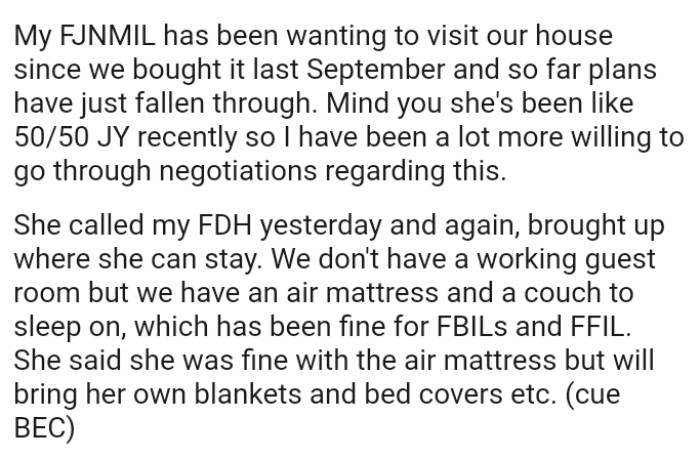
OP's future MIL dropped the gem of telling them to just board their cats for the weekend she wants to come over

Understanding Family Hierarchies
Family dynamics often involve complex hierarchies that can lead to power struggles, particularly around issues like pet care.
Research in family psychology suggests that when one member imposes their views, it can create tension and resentment.
Understanding these dynamics is crucial for resolving conflicts effectively.
Exploring the Dynamics of Control and Neediness
The request from the future mother-in-law (MIL) to board the cats encapsulates themes of control and neediness often seen in familial relationships. According to Dr. Linda Hartling, an expert in relational-cultural theory, such behaviors can reflect underlying insecurities and a desire for validation. The MIL's insistence on boarding the cats may stem from her need for control over the situation, especially as she faces the impending arrival of a new family member.
Research in family psychology shows that patterns of neediness can disrupt harmonious relationships, leading to conflicts over boundaries and autonomy.
On top of all this, she also started talking about spending a few weeks in their town
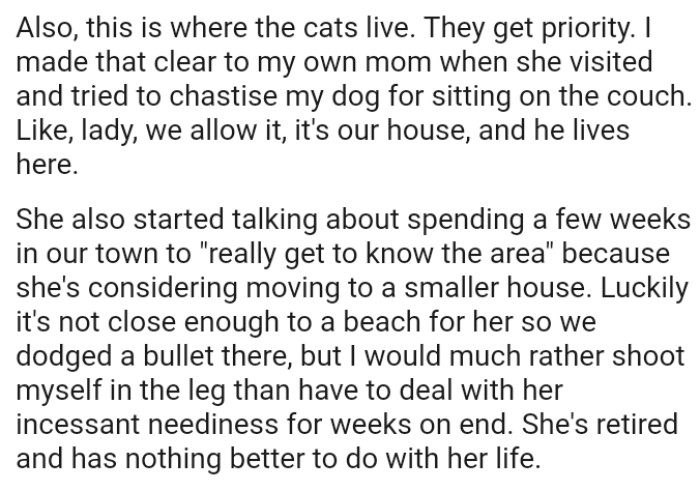
Redditors headed to the comments section to share their thoughts, and here are some of them below

A hotel sounds like a better option for everyone

Behavioral studies indicate that power struggles within families can stem from differing values and beliefs about pet care.
Recognizing these differences can help family members approach conflicts with more empathy and understanding.
Encouraging open discussions can promote healthier dynamics and reduce tension.
Understanding the motivations behind such requests can foster greater empathy in addressing conflicts. Studies indicate that individuals with high levels of anxiety about change may resort to controlling behaviors as a coping mechanism. The MIL's neediness may reflect her fears about the changes that accompany the arrival of a new baby, creating a complex dynamic where her emotional needs clash with the daughter-in-law's autonomy.
By acknowledging these underlying fears, family members can engage in more productive conversations that prioritize understanding and support.
A redditor wants someone to explain to their MIL what cat dander and allergies mean
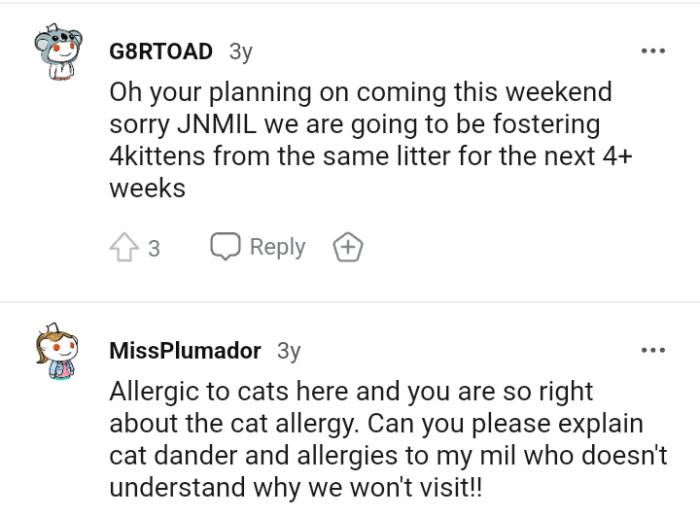
She should board part of her family since she wants the OP to board part of hers

The OP shared this somewhere in the comments
Our cats and dogs get along due to months of training and slow introductions. Our cats are fairly dog-savvy, but it definitely depends on the dog's attitude and prey drive as well. We've had to turn away fosters known for chasing small animals. I'd rather not be stressed out about my cats when she's visiting. To be honest, if I could spend the day hiding under my bed like my cats do when people are around, I would.
Guests don't need to stay more than a couple of days unless the host allows it
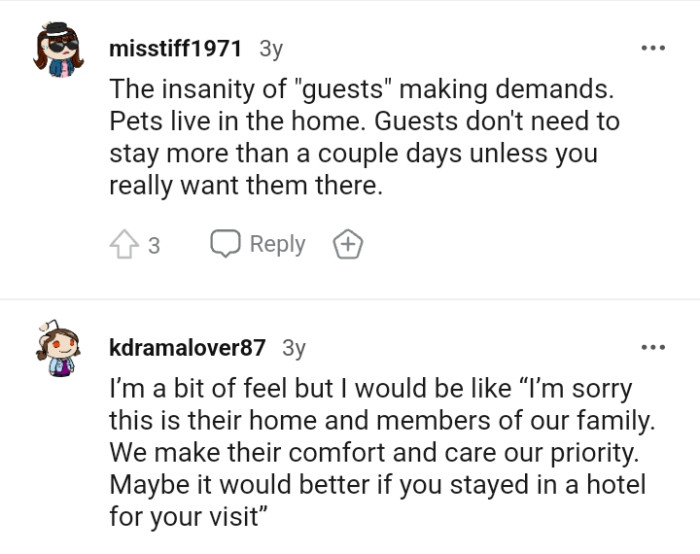
The Role of Compromise in Family Relationships
Compromise is essential in family relationships, especially when addressing differing views on pet care.
Research shows that finding common ground can foster cooperation and improve relationships.
Encouraging family members to collaborate on pet care decisions can lead to more positive outcomes.
The Importance of Setting Boundaries
Establishing healthy boundaries is essential for navigating familial conflicts effectively. Research highlights that boundaries clarify expectations and foster mutual respect within relationships. The future daughter-in-law's reluctance to board her cats signifies her need to assert her autonomy and the importance of her emotional connections to her pets.
Setting clear boundaries regarding the care of pets can help mitigate tensions and ensure that all parties feel respected and valued in their emotional needs.
She can board her dogs since she has enough money to travel to the OP's place

Telling her to find a hotel that accepts pets
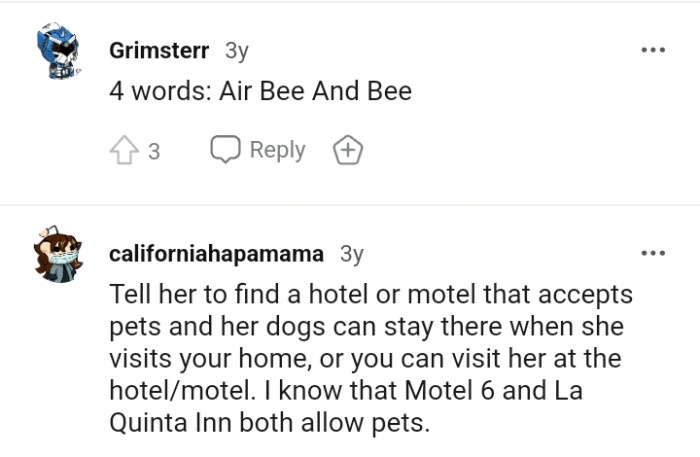
The cats will come home to a place that smells like foreign dogs
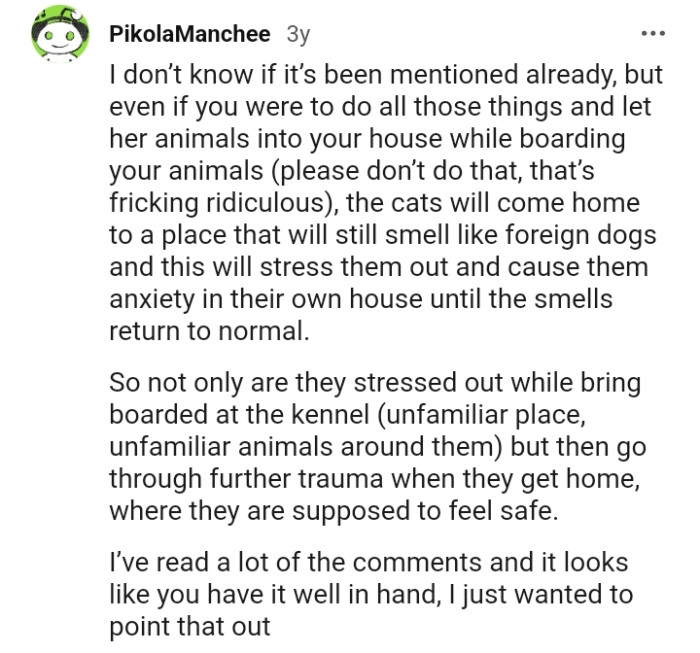
Experts recommend that families establish clear agreements around pet care responsibilities to reduce misunderstandings.
These agreements can help clarify expectations and promote respect among family members.
Implementing collaborative decision-making processes can enhance family dynamics and reduce conflict.
Moreover, exploring the emotional significance of pets within family dynamics can provide valuable insights. Studies show that pets often serve as emotional support for individuals, particularly during stressful transitions. Understanding the role that animals play in family members' lives can foster empathy and reduce conflicts over pet care.
Encouraging open discussions about the emotional importance of pets can help family members navigate these conflicts with greater compassion and understanding.
Some redditors mentioned that even if the cats were to be boarded, they would come home to a place that would still smell like foreign dogs, which would stress them out. So they wouldn't just be stressed while boarded at the kennel, but they would also go through further trauma when they get home, where they are supposed to feel safe, and that's just wrong.
Effective Communication Strategies
Effective communication is vital in addressing conflicts involving family dynamics and emotional attachments. Research indicates that using empathetic communication strategies can facilitate understanding and cooperation. The future daughter-in-law might benefit from expressing her feelings about her cats while also acknowledging her MIL's emotional state.
Practicing active listening and validating each other's feelings can create a safe space for dialogue, leading to more amicable resolutions.
Psychological Analysis
The request from the future mother-in-law reflects common dynamics of control and neediness within families. It's essential to recognize that these behaviors often stem from deeper emotional insecurities. By fostering open dialogues and setting clear boundaries, families can navigate these challenges more effectively.
Analysis generated by AI
Analysis & Alternative Approaches
This situation highlights the complexities of family relationships, particularly regarding emotional attachments to pets. As research shows, establishing healthy boundaries and fostering open communication is crucial for navigating conflicts. By prioritizing empathy and understanding, families can create a supportive environment for all members.
Enhancing Communication to Foster Cooperation
Effective communication is vital in navigating family dynamics, particularly around contentious issues like pet care.
Research indicates that practicing active listening and expressing empathy can lead to more harmonious interactions.
Encouraging family members to share their feelings openly can foster a supportive environment.
Psychological Analysis
This scenario highlights the complexities of family dynamics in decision-making processes.
Encouraging open communication and establishing clear agreements can help families navigate these challenges and foster healthier relationships.
Analysis generated by AI
Analysis & Alternative Approaches
Family hierarchies can complicate discussions around pet care, often leading to conflicts.
By fostering compromise and enhancing communication, families can navigate these challenges more effectively.
Ultimately, promoting a collaborative environment is key to reducing tension and building stronger relationships.



